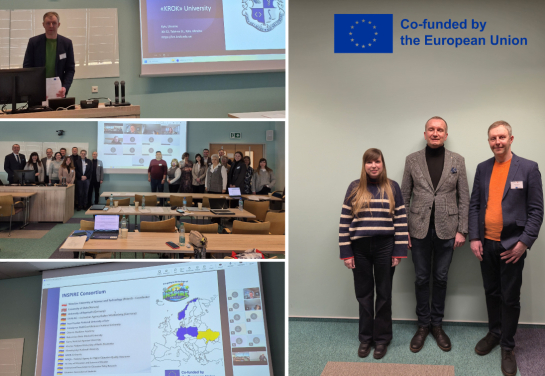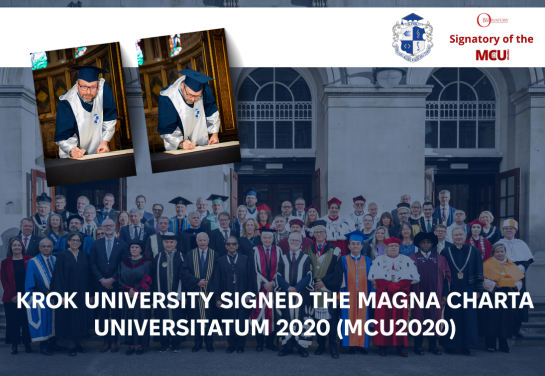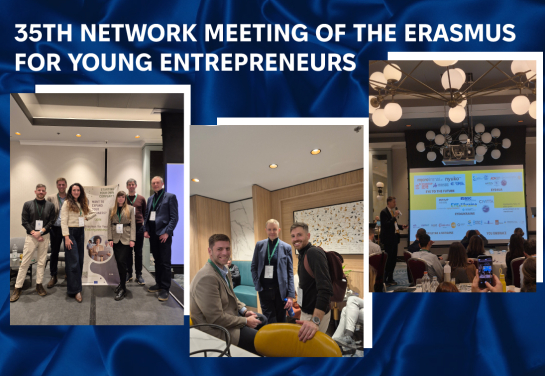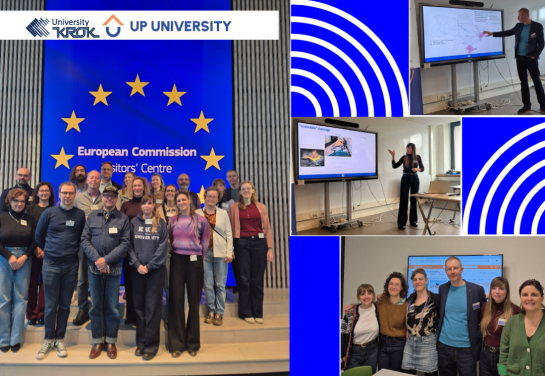 KROK University
KROK University
KROK University
KROK University
On January 19–20, 2026, the kick-off meeting of the consortium of Erasmus+ CBHE INSPIRE project - Institutional Accreditation for Sustainable Progress, Innovation and Excellence of the Ukrainian Higher Education System towards European Integration - took place at Wroclaw University of Science and Technology (Poland).
The event brought together partners from Ukraine, Poland, Germany, and Norway, as well as representatives of the Ministry of Education and Science of Ukraine and the National Agency for Higher Education Quality Assurance. During the meeting, participants laid the foundations for a shared vision of institutional accreditation, discussed the key objectives of the project, cooperation mechanisms, and the next steps for its implementation.
The INSPIRE project aims to support systemic changes in the quality assurance of higher education in Ukraine and its harmonization with European approaches and standards.
“KROK” University is sincerely proud to be a partner in this national-level project and to contribute to the development of a modern, sustainable, and innovative higher education system in Ukraine.
On November 13, 2025, KROK University signed the Magna Charta Universitatum 2020 (MCU2020) at King’s College London (London, UK).
Becoming a signatory of the Magna Charta Universitatum is a prestigious recognition that positions our University alongside more than 900 higher education institutions worldwide committed to:
• academic freedom
•
institutional autonomy
• responsibility in advancing knowledge and serving
society
Mykhailo Laptiev, Vice President of the University, PhD in Economics, Associate Professor, was the signatory on behalf of KROK University. His participation underscores the strategic importance of this step for the University’s international development and strengthens KROK’s position within the global academic community.
We sincerely thank the Magna Charta Observatory for its high level of trust and for the opportunity to join the global academic network. We look forward to further fruitful cooperation and participation in international initiatives that will contribute to strengthening university values worldwide.
KROK University is proud to become part of this international initiative and to take another step in strengthening its academic mission aimed at the development of knowledge, innovation, and responsible leadership.
On November 13-14, the 35th Network Meeting of the Erasmus for Young Entrepreneurs (EYE) program took place in Brussels, Belgium, bringing together representatives of partner organizations from across Europe. “KROK” University was represented by Andrii Lotariev, Vice-Rector for Science, and Anna Drobyna, Head of International Office. During the two-day event, participants discussed key developments within the program and shared best practices for enhancing international entrepreneurial exchanges. Among the highlights of the meeting were:
- Announcement of the preliminary results of the 14th Call, providing insights into current project performance and future priorities.
- Consortium meeting, where partners coordinated ongoing activities, reviewed progress, and planned upcoming program stages.
- Discussions on new developments in the EYE program, focusing on improving collaboration, digitalization, and support mechanisms for young entrepreneurs.
"KROK" University continues its active engagement in the EYE program, contributing to the expansion of international opportunities for aspiring entrepreneurs and strengthening cooperation with partner institutions across Europe.
On November 3–7, 2025, a meeting of the UP University consortium of European universities was held at Artevelde University of Applied Sciences (Ghent, Belgium). The event was attended by representatives of “KROK” University: Andrii Lotariev, Vice-Rector for Science, and Anna Drobyna, Head of International Office.
During the meeting, consortium members worked on developing competencies necessary for the implementation of joint educational programs within the alliance. The delegations also visited the Ghent City Hall, where they learned about municipal sustainability projects currently being implemented in the city.
One of the key events was the consortium’s visit to the European Commission in Brussels, where participants discovered new funding opportunities for higher educational institutions and university alliances, as well as the planned changes to the Erasmus+ program for 2028–2034.
Representatives of “KROK” University also gave a lecture titled “The current state of education in Ukraine during the full-scale war”, sharing relevant challenges and insights of the Ukrainian higher education system.











